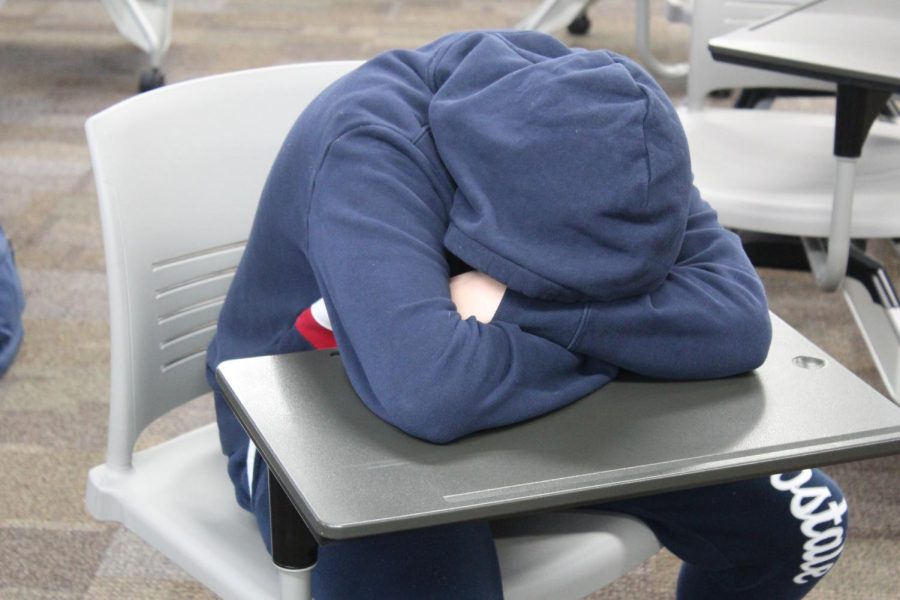In-Depth: Students are not getting enough sleep
March 14, 2022
For many Elk Grove High School students, getting enough sleep is a nightly struggle.
According to the Center for Disease Control (CDC), teenagers 13 to 18 years old should be getting eight to 10 hours of sleep a night.
The Guardian sent a Google Form survey to EGHS students about their sleep habits. Of the 272 EGHS students who responded, 215 (79 percent) reported that they get less than eight hours of sleep most nights.
Students have a variety of reasons for getting less sleep than they need or want. Maintaining a routine can be one such challenge.
“On the weekends, I usually go to bed a lot later, and then when it comes back to the weekdays, I just kind of struggle to get back to my regular sleep routine,” senior Leslie Raygor said.
The survey reflects this trend; the most frequently-reported bedtime on school nights was midnight. However, on weekends, the top two answers — tied at 48 responses each — listed bedtimes of 1 a.m. and 2 a.m.
Raygor said going to bed on Sunday nights is hard because she knows she has school the next day, which makes her want to avoid sleep.
“Come Sunday night, I end up going to bed at 2 a.m., also because I can’t sleep earlier than that,” she added.
Another reason she —and many students like her, according to the survey — stay up later is to work on homework.
“Yesterday, I kind of knew that school was coming, and I still had a lot of assignments to complete, too, before I came in the next day, so I ended up staying up really late just trying to finish everything,” Raygor said. “That just helps me stay up really late, and then I wake up really tired.”
Additionally, people’s preferences of morning or night can influence their sleep routine.
More than one third of students who responded to the survey said they feel most energetic at night, rather than in the morning, afternoon or evening. For some students, like Raygor, this impacts productivity at night.
“Usually, when I’m getting school work done, or I’m just doing something I need to do, I get such a burst in motivation and energy to do it between like 10 o’clock and 2 a.m,” Raygor said. “I don’t know why, but between those times, I get the most work done and most efficiently.”
Furthermore, for some students, sleeping is not just a matter of feeling tired enough to go to bed. Senior Giselle Cordova is active in sports, works at a job and an internship, and takes rigorous classes, so she feels tired often.
Sleeping, however, is challenging for her.
“Usually, my sleep schedule is kind of random at this point, really,” Cordova said. “It started, I’d say last month, where I had these moments where I couldn’t really sleep. It was kind of 12 minutes a week kind of sleep. It was really bad.”
Cordova said she tries to make up for a lack of sleep by sleeping in on weekends, but being so involved makes it difficult.
“I try to sleep in on weekends, but with morning practice on Saturdays, that doesn’t really happen, and then work — I work Sunday mornings — so it doesn’t really happen as often as I’d like it to, but I try to as much as I can because of my sleep schedule being all over the place,” Cordova said.
A self-identified “coffee fanatic,” Cordova explained that her coffee consumption also plays a role in her lack of sleep.
“I am obsessed with Dunkin Donuts, so I get, literally, the medium-sized French vanilla coffee with already three packs of sugar in it, and I already add like eight more packs, which is really bad,” she said. “I usually get like two of those a day or maybe three, and it’s really bad, so I think that’s what’s kind of messing up with my sleep schedule a whole lot.”
Looking past the coffee, though, Cordova said stress and mental health is a huge factor that makes sleeping a challenge.
“I also think it’s just the lack of actually relaxing and having me time,” Cordova said. “I think just all of that combined, it’s like, you need some time for yourself to actually destress, and I think that’s what’s kind of causing it: mostly stress.”
Similarly, 55 percent of students who filled out the survey indicated stress as one factor that affects their sleep schedules. This stress can also be a cycle.
“Stress leads to no sleep, and then no sleep leads to much more stress, and it’s just the worst,” Cordova said.
Some students who stay up until midnight or later that late have earlier bedtime goals in mind, but some students don’t actually achieve that goal.
“I would definitely try to stick to a more strict routine and go to bed at 10:30 every night, but I don’t know if that’s realistic for me,” Raygor said.
According to Cordova, prioritizing her health and well being would help her adjust her sleep schedule.
“Personally, I think I would need to cut down on the coffee,” Cordova said with a laugh. “It breaks my heart, but I would need to cut down on the coffee, and I think for sure, I would need to find some time for myself to destress just because I occupy myself with a lot of things, so I think that’s a big factor in all my stress.”





